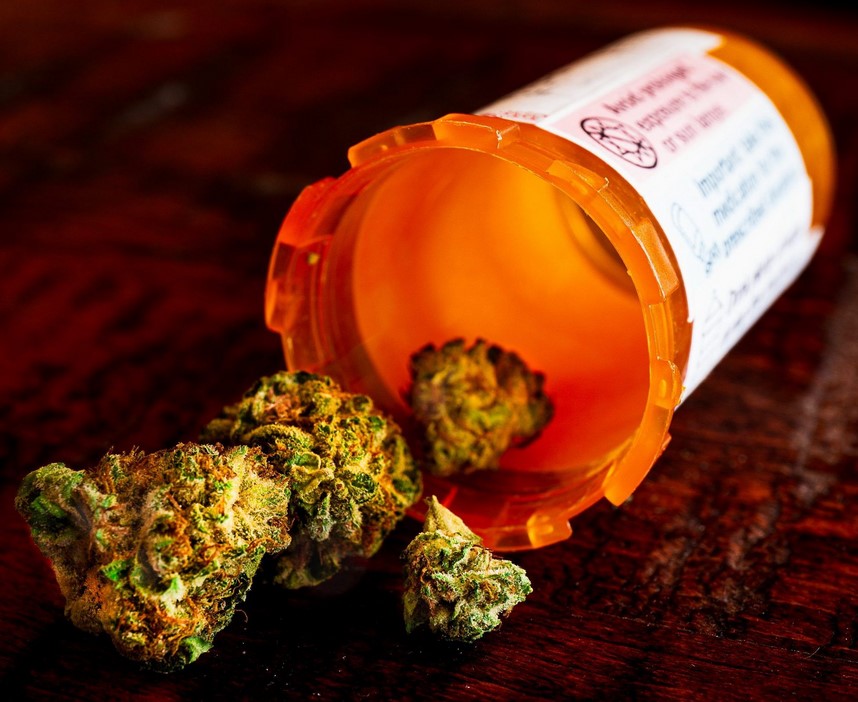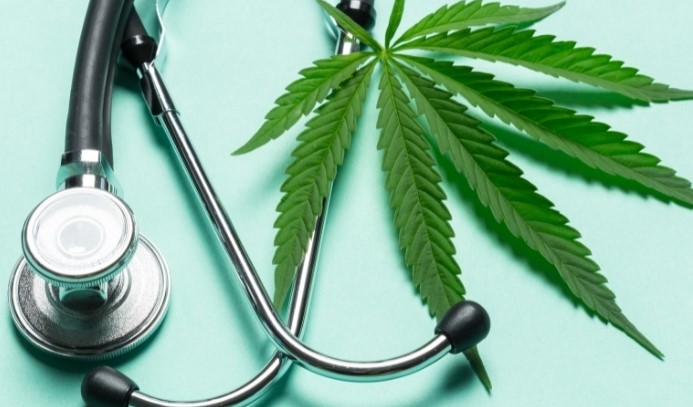Non classé
Can Cannabis Help Tourette Syndrome?
Alternative therapies for many serious neurological diseases are now being explored, resulting in some amazing discoveries. Using medical marijuana and/or CBD to treat Tourette’s syndrome is one such example, as the issue of their effectiveness arises.
Tourette syndrome, also known as Tourette’s, is on many medical marijuana qualifying condition lists. It’s a neurological condition characterized by tics that are uncontrollable. These tics can be simple or severe in nature and can include repeating movements or vocalizations.

Cannabis has been linked to improvements in attention, behavior, and coordination in children with Tourette syndrome. According to some studies, cannabis use might help alleviate the symptoms of Tourette syndrome by changing activity in the brain. This hypothesis is bolstered by many case reports and small-scale clinical trials. However, marijuana research is still at its early stages, leaving scientists with a lot of unanswered questions.
So, can cannabis help with Tourette’s syndrome? Let’s have a look.
About Tourette syndrome
Tourette syndrome is a neurological condition marked by involuntary movements (tics) and vocalizations (or tics), which may be distressing, difficult to conceal, and even dangerous.
There is currently no known cure for Tourette syndrome. Treatment focuses on alleviating the symptoms that disrupt daily activities, but current medicines have been linked to undesirable side effects such as weight gain, tiredness, and sadness.
Research on Cannabis for Tourette Syndrome
In 2013, one of the most in-depth studies on marijuana and Tourette’s was published in Behavioral Neurology. It includes case reports, retrospective research, and two clinical trials.
The case studies indicate that tics, attention, self-injurious behavior, and hypersexuality may all benefit. One particular client’s TTS SG scores decreased from 41 to 7!
The two trials had a total of 36 and 24 patients, respectively. THC was tested against a placebo in both studies. After therapy with THC, the researchers discovered significantly superior outcomes compared to placebos.
The researchers also discovered that the drug was completely devoid of severe adverse effects. The following were some of the minor side effects observed:
- Drowsiness
- Dry mouth
- Dizziness
- Headaches
- Nausea
- Hot flushes
- Reduced concentration
- Cheerfulness
- Anxiety
- Depression
In a 2017 study published in The Journal of Neuropsychiatry and Clinical Neuroscience, researchers discovered similar results. The trial included 19 persons with Tourette’s syndrome, including 9 boys and 10 girls. Tics were reduced by 60% after cannabis therapy was administered to them. Furthermore, the authors determined that 18 of the 19 participants were at least “much relieved.”
In 2017, researchers from the International Journal of Molecular Sciences conducted a study on cannabinoids and vocal tics. Two individuals suffering from Tourette syndrome had speech difficulties comparable to stuttering. One vaped medical marijuana, whereas the other took dronabinol, which is a synthetic version of THC. Both patients showed overall improvements in symptoms.
Finally, a 2017 study published in Brain Sciences focused on a patient with treatment-resistant Tourette syndrome. The 22-year-old male was dealing with severe and complicated symptoms as a result of his condition. After only two weeks on nabiximols, another synthetic cannabinoid, he said he had experienced significant improvements.
Because no long-term studies exist to date, we can’t really come to any conclusions about marijuana and Tourette syndrome. However, the existing research is promising, suggesting that cannabis may help, especially if other therapies have failed.
Can CBD Oil Help Tourette’s Syndrome?
Another disadvantage of cannabis use to treat Tourette syndrome is that it includes THC. The issue with this is that researchers believe THC may harm the growing brains of young individuals. Because most people develop Tourette syndrome in childhood, this is a serious problem.
Many patients and their families have asked whether CBD has any therapeutic benefits, which has fueled interest in utilizing it. CBD is a chemical produced by the cannabis plant, just like THC. It does not, however, produce the same level of intoxication as THC. As a result, parents have taken to using it to treat childhood disorders such as epilepsy and it looks safe.
There is presently no proof that CBD alone helps with Tourette syndrome. However, a clinical study is currently underway to evaluate the effects of cannabis with various THC:CBD ratios on Tourette syndrome.
The study will evaluate three types of cannabis. The first is high in THC but low in CBD, while the second is rich in CBD but low in THC. The third souche has an equal amount of both cannabinoids.
The findings should be ready later this year, and they will provide more information on whether CBD can help Tourette’s syndrome. If the results are positive, they may pave the way for patients with Tourette’s to benefit from cannabis. This might help not just youngsters, but also adults who wish to use cannabis but don’t want to get high on THC.
How Can Marijuana Help with Tourette’s Syndrome?
The distinction between pure CBD oil and medical marijuana is in the ingredients. While CBD is in its pure form, medical marijuana contains THC and CBD, two distinct chemical components.
Despite this, there are those who claim to have experienced decreased tics and a reduction in mental disorders that typically accompany the condition while using cannabis. The same, however, may be said for CBD; the research and data are insufficient to determine how medical marijuana may assist with Tourette’s syndrome and its symptoms.
Medical Marijuana 101

Marijuana has been legalized (or decriminalized) for medical purposes in 36 states and four territories, according to this study from the Institute of Medicine, which concludes that scientific evidence suggests the therapeutic efficacy of THC and other cannabinoids. Many US states have chosen to decriminalize cannabis use for medical reasons as a result of this paper, issued by the Institute of Medicine, which finds that scientific data suggest the potential medicinal benefits of THC and other cannabinoids.
On a federal level, marijuana is still classified as a Schedule I narcotic, which means it has a high potential for abuse and no proven medical use and therefore its distribution is strictly prohibited. The state vs. federal perspective differs: when the two collide, each scenario results in a unique conclusion based on the circumstance.
The most significant difficulties regarding medical marijuana include how to regulate its prescription, dispensing, and registration of authorized consumers. Some states have established customized systems for enrolling and monitoring patients, while others are still trying to figure out what works best for them.
Despite the fact that there is no scientific evidence to suggest that marijuana is effective in treating cancer, the therapeutic effect of medical cannabis has been demonstrated. It’s advised in many circumstances in patients dealing with chronic pain, post-traumatic stress disorder (PTSD), late-stage cancers, and chemotherapy-induced vomiting and nausea.
The usage of medical cannabis to treat pain is probably the most popular application in the United States. Chronic pain is safer than opiates (such as oxycodone or Vicodin) and can apparently take the place of NSAIDs (non-steroidal anti-inflammatory drugs) for people who can’t tolerate them due to kidney or ulcer problems, as well as GERD.
Medical marijuana appears to help with neuropathic pain, which is a tough disease to treat in general. One reason for it is its muscle-relaxing property, which explains why it’s frequently advised to people with Parkinson’s disease (to relax their tremors), fibromyalgia, endometriosis, interstitial cystitis, and other ailments where the common final pathway is chronic pain.
Nausea and weight loss are two additional important medical marijuana applications. It can also be used to treat glaucoma. It is believed to increase the hunger, which may help people who are having difficulty controlling their food intake avoid undesirable weight loss.
The Recreational Use of Marijuana
Because a user of marijuana does not need to have a medical condition, the recreational usage of the drug differs from its medical aspect. With all 50 nations involved, the laws in the United States are changing on a daily basis.
Currently, the states of Colorado and Washington have legalized small amounts of marijuana for adult recreational use. Others are likely to follow in their footsteps.
Risk & Side Effects
Because cannabis is classed as a Schedule I narcotic, there are several hazards and negative effects that may not affect everyone. The following are some of the risks and side effects associated with medical marijuana:
- Changes in sleep and appetite
- Overall fatigue
- Problems with memory and mood
- Slowed-down reaction time
- Potential paranoia
The Marijuana Risks
The fear of getting high from marijuana is natural for those who have never used it, as well as the questions about what damage it might do to one’s lungs and brain. Marijuana has not been approved by the FDA as a medicine, and the CDC does not consider it to be a medicine either.
There’s also the risk of poisoning the lungs and cardiovascular system, as well as unknown long-term consequences it may have on your brain, when smoking medical marijuana. Another concern with medical cannabis is that the plants’ components can vary, creating uncertainty about what sort and how much of a chemical you’re receiving.
The uncertainty of whether or not medical marijuana will make you high, as well as potentially cause addiction, is the same. The difficulty stems from the fact that in the last two decades, the THC content in marijuana flower has increased by 212%.
The more potent THC created visible withdrawal symptoms, such as anger, irritability, sadness, restlessness, headache, loss of appetite, sleeplessness, and powerful marijuana cravings.
According to a study conducted in the United States, 9% of people who try marijuana will become addicted, with 25–50 percent of those people being regular users. According to a study done in the United Kingdom in 2015, marijuana use is linked to “greater severity of addiction, especially among young people.”
Tourette’s Syndrome
Tourette’s syndrome is a severe nervous system condition that leads to sudden, repeated gestures, twitches, and noises. People with Tourette’s Syndrome are unable to stop their tics as they arise. They can happen at any time or place because they occur rapidly.
Types of Tics
All tics can be divided into two groups: motor and vocal.
- Tics are bodily movements, such as blinking, jerking parts of the body, shaking, shrugging the shoulders, facial grimacing, and so on.
- Vocal tics include shouting out a word or phrase, humming a tune, clearing the throat, sniffing, and so on.
The following are some more examples of tic disorders: Both of these tics can be simple (sudden, brief, and limited to a few muscle groups) or complex (additional minor movements or noises that might appear purposeful, such as jumping or tapping things).
Triggers for Tics
Tics are more likely to appear when you’re nervous or excited, and certain events can exacerbate them. The majority of common causes include excitement and anxiety, as well as hearing or seeing someone sniff or cough in order to elicit the same behavior.
Comorbidities
Neurobiological factors, such as anti-NMDA receptor autoantibodies and neuroinflammation also play a role. It’s best to avoid brains at all costs!
Current Treatments for Tourette’s Syndrome
The existing medical therapies for Tourette’s syndrome, while unable to cure it, include:
- Use of behavioral therapy (recommended) along with pharmaceutical intervention (haloperidol, pimozide, aripiprazole) to reduce tics and their intensity
- Speech therapy
- CBIT is a form of comprehensive behavioral therapy for tics that combines habit reversal training and psycho-education with function-based behavioral therapies.
- For persons whose motor and/or vocal tics severely impact their quality of life and who have tried all other therapies without getting relief, deep brain stimulation (DBS) is a treatment option.
- Dental orthotic devices that are often used for TMJ (temporomandibular joint) therapy
- Despite the fact that cannabis is still in its early phases of study, the potential is considerable, and there is a great desire for more randomized, large-scale trials.
How To Choose The Best CBD For Tourette’s?
Always look for these characteristics if you’re looking to alleviate symptoms of Tourette’s syndrome and want to try CBD oil:
- Hemp oil is extracted using 100% organic ingredients (both hemp and soil, as hemp, has the ability to absorb elements and minerals from the soil)
- The entourage effect is why Full-spectrum CBD has a synergistic benefit, since it incorporates the effects of many different cannabis components at the same time.
- To make the product as clean and safe as possible, without using any dangerous chemicals, we use CO2 extraction to remove impurities.
- Third-party tested for transparency
How to use Medical Marijuana for Tourette’s?
Although there are no reports, it is believed that individuals use marijuana to alleviate their symptoms. The first case documented a reduction in tics and associated issues.
Despite the fact that inhaling medical marijuana appears to be the best option, with no clear evidence to support it, no health professional will urge people who have Tourette’s to do so.
Frequently Asked Questions
What is Tourette’s Syndrome?
Tourette’s syndrome is a severe neurological problem that causes rapid, frequent motions, twitches, and noises. Unfortunately, the person suffering from it is unable to control their behaviors.
Can CBD help treat the symptoms of Tourette’s syndrome?
Although some study may have suggested otherwise, it’s still premature to claim that CBD helps with the symptoms of Tourette’s syndrome. The lack of randomised, large-scale trials is frustratingly delaying this conclusion.
Is medical marijuana better than CBD for Tourette’s syndrome?
While some people believe that the use of THC improves their sexual performance, there has yet to be any actual evidence to support those claims. It’s difficult to think otherwise until more randomized, large-scale trials are conducted.
How does Tourette’s syndrome manifest itself?
Individuals with Tourette’s syndrome experience uncontrollable, repeated movements, noises, or twitches. This neurological disease may be so severe that it severely affects a person’s life.
What’s the current treatment for Tourette’s syndrome?
Medical therapy for Tourette’s syndrome includes speech therapies, medications, deep brain stimulation, Comprehensive Behavioral Intervention for Tics (CBIT), a dental orthotic device, and, in some cases, medical marijuana.
Is medical marijuana legal?
On a national level, marijuana is classified as a Schedule I drug, which means it has a high potential for abuse and no approved medical usage. That being said, 36 states and four territories have decriminalized and legalized its usage for medical reasons. Its legality is still in question.
What is medical marijuana used for?
At present, medical marijuana is utilized for chronic pain management, particularly neuropathic pain, nausea and vomiting alleviation, as an aid in weight loss prevention and management, as well as sicknesses that respond to muscle relaxants.
Are some CBD oils better than others?
When it comes to selecting the proper CBD oil, there are a few things to consider. Make sure the components are all organic, even the soil in which the hemp was grown. Only purchase full-spectrum CBD oil that has been extracted properly. Finally, check whether or not the product has been third-party tested to assure transparency.
Final Thoughts
Cannabis, according to anecdotal evidence, may help treat many of the symptoms of Tourette syndrome. However, there are not enough large-scale clinical trials to determine how or why it works. As a result, some patients may benefit from marijuana for Tourette’s while others may not.
Consult your doctor if you want to use cannabis for Tourette syndrome, as with any medical condition. If you’re treating a kid or a teenager, medical supervision is even more important.
While THC has been shown to have beneficial effects on mental health, it can also induce mental health concerns if used throughout gestation. As a result, medical marijuana may not be the ideal therapy for children with Tourette’s Syndrome.
However, if you are a grownup and have tried but failed to treat your Tourette’s with traditional medicines, cannabis may be worth a try.


